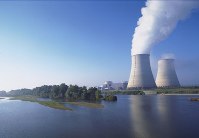Investing in new nuclear generating capacity or any other form of energy would be too expensive and come online too late, France's state audit office has concluded. Extending the operating lives of its existing nuclear power reactors would be its best option.
 |
| Belleville (Image: EDF) |
The Cour des Comptes (Court of Audit), at the request of prime minister Francois Fillon, has released a report into the past, present and future costs of nuclear power in the country.
France, the court estimated, has so far spent €188 billion ($246 billion) on nuclear energy. The total cost of building the facilities needed for nuclear electricity generation in France (excluding the cost of constructing the Superphenix commercial prototype fast breeder reactor) is put at €121 billion ($158 billion). Of this, the cost of constructing the country's 58 second generation power reactors - with a combined generating capacity of 62,510 MWe - is estimated to be €96 billion ($125 billion), while the initial investment needed to build the country's eight first generation reactors - which have already been shut down and are being decommissioned - is put at €6 billion ($8 billion).
The development of fuel cycle facilities - particularly reprocessing plants - cost France some €19 billion ($25 billion). A further €55 billion ($72 billion) has so far been spent on research, while the construction, operation and shutdown of Superphenix cost €12 billion ($16 billion).
French power reactors were originally only licensed to operate for 30 years, but they are now subject to a ten-year review to allow for their continued operation. So far, just two reactors - at Tricastin and Fessenheim - have received authorization to continue operating up to 40 years. The court says that if all current units are limited to a 40-year operating life, 22 of the country's 58 reactors will have to shut down by 2022. Therefore, to keep nuclear's share of total electricity generation at around the current 75% level, considerable invest in new capacity - equivalent to 11 new EPR units - would be required by then. However, it says that the likelihood of such a program of short-term investment appears "highly unlikely or impossible."
The court suggests that as no decision to invest in new nuclear capacity has yet been made, France will have only two options: to extend the operating lives of its current reactors beyond 40 years or to make rapid and significant changes to its energy mix. Either option will require additional investment. The duration of a nuclear power plant's operating life has a significant impact on the actual cost of production, the audit office noted as the investment is spread over several years. At the same time, extending a plant's life pushes back the decommissioning expenses and the need for investment in new generating capacity.
The cost of constructing nuclear power plants has risen over time, the audit office says. In 2010 euro vales, the cost has increased from €1.07 million per MW when the Fessenheim plant was built in 1978, to €2.06 million per MW when the Chooz units 1 and 2 were built in 2000, up to projected costs of €3.7 million per MW for the 1630 MWe EPR being built at Flamanville at an estimated cost of €6 billion ($8 billion).
Utility EDF, which operates all of France's power reactors, invested some €1.7 billion ($2.2 billion) in maintenance projects at its nuclear plants in 2010. The company announced an investment program in 2010 under which it will invest €50 billion ($65 billion) in its plants between 2011 and 2025, representing an annual average of €3.3 billion ($4.3 billion). However, additional upgrades specified by the French nuclear safety regulator, the Autorité De Sûreté Nucléaire (ASN), following the Fukushima nuclear accident will add a further €5 billion ($6.5 billion) to this program (or an average €3.7 billion ($4.8 billion) per year).
The operating costs of EDF amounted to €8.9 billion ($11.6 billion) for the production of 407.9 terawatt-hours (TWh) in 2010, according to the court. The average generating cost, the court calculated, was €49.5 ($64.7) per megawatt-hour (MWh). According to the audit office, whatever decision is made to maintain the current level of nuclear energy usage in France will require significant investment in the short- and medium-term at a rate of at least double the current level of investment. This, it says, will increase the average cost of production by about 10%.
The future costs for decommissioning all of France's nuclear facilities (including reactors, research facilities and fuel cycle plants )and disposing of radioactive wastes are estimated to be €79.4 billion ($103.8 billion). The cost of demolishing facilities totals €31.9 billion ($41.7 billion), including €18.4 billion ($24.1 billion) for dismantling EDF's 58 currently operating reactors, the court estimates. The costs of managing used fuel are put at €14.8 billion ($19.3 billion), while waste disposal will cost €28.4 billion ($37.1 billion). However, the court notes that these future costs estimates are "fragile" because of the lack of firm decommissioning costs and the lack of final disposal plans. A massive increase in future costs would have a "significant but limited" impact on the annual cost of production, it said.
Ahead of the April presidential election, the Socialist Party's presidential candidate, Francois Hollande, has proposed reducing nuclear's share of the country's energy mix to about 50% by 2025, down from the current level of almost 75%. However, in a report released in November 2011, Union Francaise de l’Electricite (UFE), the French professional association for the electricity industry, concluded that this would be costly, raise energy prices and increase carbon emissions.
Researched and written
by World Nuclear News






_55401.png)
_23009.jpg)






